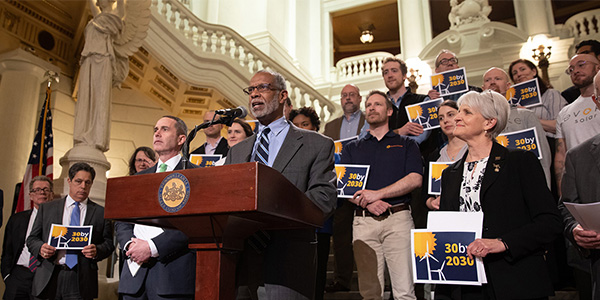By Christen Smith
Pennsylvania Democrats want to nearly quadruple subsidies for renewable resources in the first tier of the state’s 2004 Alternative Energy Portfolio Standards (AEPS) mandate, hoping the expansion will push the state closer to its looming carbon-reduction goals.
Rep. Carolyn Comitta (D) and Sen. Art Haywood (D) sponsored companion proposals — House Bill 1195 and Senate Bill 600 — on April 26 that they say would “modernize” the once forward-looking AEPS and bring it in line with neighboring states like Maryland and New Jersey, where lawmakers have passed ambitious energy plans to phase out fossil fuels over the next 30 years. The bills would boost the usage requirement of Tier 1 renewable resources in the AEPS from 8% to 30% by 2030. The plans also dedicate 7.5% of that target to in-state grid-scale solar and 2.5% to distributed solar generation and asks the Public Utility Commission to study the benefits of an energy storage program.
“It is long overdue for Pennsylvania to implement new clean energy goals to create good jobs, cut pollution and ensure we are a sustainable and prosperous state for the future of everyone,” Haywood said during a rally April 10 with fellow co-sponsors from the bicameral Pennsylvania Climate Caucus.
“The fierce and immediate urgency of climate change requires a fierce and immediate response,” said state Rep. Steve McCarter (D). “Thirty by ’30 is an excellent immediate goal. It’s reasonable and achievable. It creates jobs in Pennsylvania. And, most importantly, it sets the stage for the much tougher work to come.”
The legislation has 33 sponsors in the House, where Republicans hold a 109-93 edge, and 18 in the Senate, where the GOP holds a 26-22 margin. Only one of the co-sponsors, Sen. Thomas H. Killion, is a Republican, but Killion is vice chair of the Consumer Protection & Professional Licensure Committee, which is also considering subsidies for the state’s nuclear generators.
Gov. Tom Wolf, a Democrat, said he supports the proposals as in line with his own environmental policies, including his decision to join the U.S. Climate Alliance announced on Monday. (See Pennsylvania Joins U.S. Climate Alliance.)
In January, Wolf signed an executive order committing the state to reducing its greenhouse gas emissions by 26% over the next seven years compared to 2005 levels and setting an additional target of 80% by 2050. On Monday, the administration released a third update to the state’s decade-old Climate Action Plan that identified 15 steps toward reducing carbon emissions by 21% by 2025, including investing in renewable energy resources, boosting the use of electric vehicles and incentivizing green building projects.
As of 2017, Pennsylvania ranks as the second largest producer of natural gas nationwide and third for coal, according to the U.S. Energy Information Administration. Just 4.5% of the state’s net electric generation comes from renewable energy resources — well short of the 18% goal by 2021 set in the AEPS.
Critics argue forcing electric suppliers to buy more power from renewable sources will set off a cascade of unintended consequences that threaten the wholesale market.
“In the words of the Independent Market Monitor, subsidies are contagious,” said Glen Thomas, president of GT Power Group. “Subsidies distort markets as policymakers attempt to favor certain resources at the expense of others.”
Thomas, an outspoken fan of deregulated electricity markets, said subsidies interfere with consumer choice. He has criticized plans to add nuclear energy to the AEPS during hearings before the House Consumer Affairs Committee and the Senate Consumer Protection and Professional Licensure Committee.
“As the cost of renewable energy continues to drop, more and more consumers will voluntarily switch to these resources and power producers will respond to the needs and wants of consumers,” he said. “That’s how markets work, and they should be allowed to do so free of mandates on consumers.”
Comitta said on Tuesday she remains open to adding nuclear energy to the AEPS. So far, the House Consumer Affairs Committee has not yet scheduled any hearings on her plan, though discussions continue on nuclear subsidies. (See Nuke Talks Continue in Pa. Assembly.)
The Senate Consumer Protection and Professional Licensure Committee has scheduled a joint hearing on updating the AEPS for May 1.



